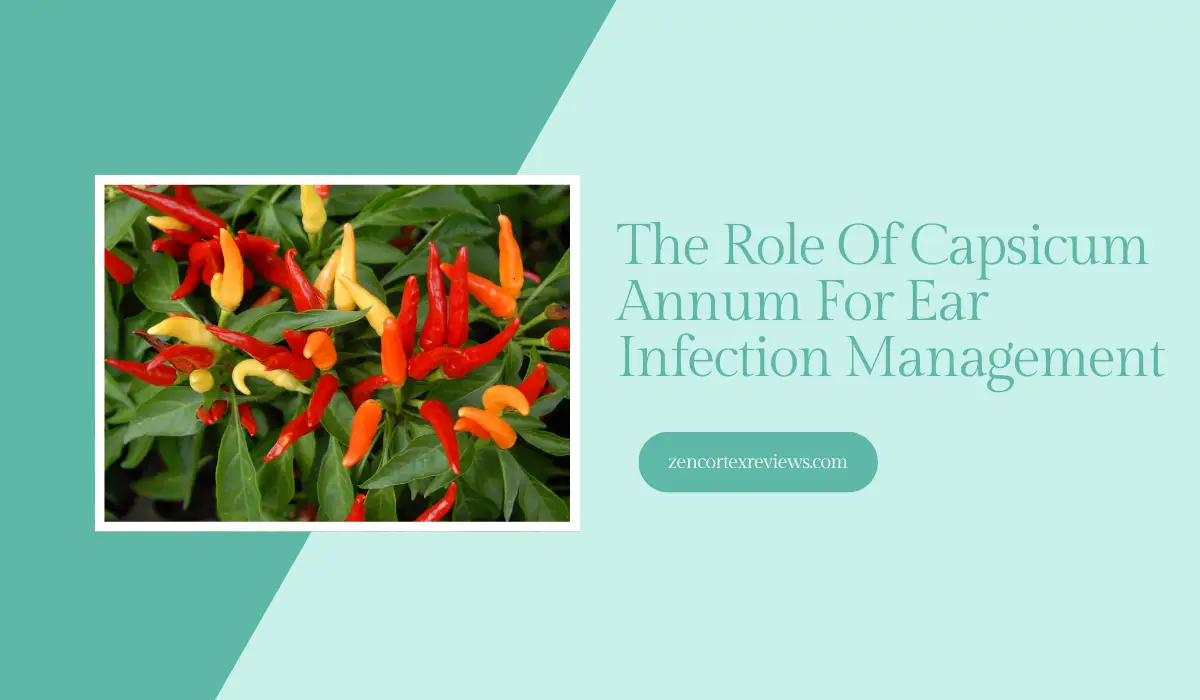The Role Of Capsicum Annum For Ear Infection Management
Uncover the benefits of Capsicum Annum in managing ear infections. From its antimicrobial properties to inflammation relief, explore its therapeutic role for optimal ear health.

Disclaimer: Our recommendations are sincere, driven by the products’ benefits. When you buy through our links, we may earn a commission, backing our testing and development at no extra cost to you.
Ear infections, also known as otitis, are a common and often frustrating condition that affects people of all ages. While traditional treatments such as antibiotics and over-the-counter pain relievers can be effective, many individuals are seeking more natural and holistic approaches to manage this persistent problem.
One such natural remedy that has garnered increasing attention is the use of capsicum annum, commonly known as chili peppers, for ear infection management.
The Therapeutic Properties Of Capsicum Annum

Capsicum annum, a member of the nightshade family, is a versatile plant that has been used for centuries in traditional medicine. Its active compound, capsaicin, has been found to possess a wide range of therapeutic properties, including anti-inflammatory, analgesic, and antimicrobial effects. These characteristics make capsicum annum a promising candidate for the treatment of ear infections.
Addressing The Symptoms Of Ear Infections
The connection between capsicum annum and ear infections stems from the plant’s ability to alleviate the underlying symptoms associated with the condition. Ear infections often result in inflammation, pain, and discomfort, all of which can be effectively addressed through the use of capsicum annum.
Capsaicin, the primary active ingredient in capsicum annum, has been shown to possess potent anti-inflammatory properties. When applied topically or taken orally, capsaicin can help reduce swelling and redness in the affected ear, providing much-needed relief for the patient. Furthermore, capsaicin has been found to have analgesic (pain-relieving) effects, making it a valuable tool in managing the often excruciating pain that accompanies ear infections.
Combating Infectious Agents
In addition to its anti-inflammatory and analgesic properties, capsicum annum also exhibits antimicrobial activity. Ear infections are often caused by bacterial or fungal pathogens, and the antimicrobial properties of capsaicin can help combat these infectious agents.
Studies have demonstrated the efficacy of capsicum annum extracts in inhibiting the growth of common ear infection-causing bacteria, such as Staphylococcus aureus and Pseudomonas aeruginosa.
Incorporating Capsicum Annum into Ear Infection Management
The use of capsicum annum for ear infection management can take various forms. One popular method is the creation of a warm oil infusion, where the chili peppers are steeped in carrier oil, such as olive or coconut oil. This infused oil can then be gently applied to the affected ear, providing a soothing and potentially therapeutic effect. Additionally, capsicum annum can be consumed orally, either as a dietary supplement or incorporated into the diet through the consumption of spicy foods.
It’s important to note that while capsicum annum shows promise as a natural remedy for ear infections, it should not be used as a replacement for professional medical care. Individuals with persistent or severe ear infections should always consult with a healthcare provider to ensure proper diagnosis and treatment. Capsicum annum can be a complementary therapy, but it should not be used as a sole treatment without the guidance of a medical professional.
Furthermore, it’s crucial to exercise caution when using capsicum annum, as it can cause irritation or discomfort if not used properly. Individuals with sensitive skin or those with open wounds in the ear should exercise particular care and consult with a healthcare provider before incorporating capsicum annum into their ear infection management regimen.
Sum up
The role of capsicum annum in ear infection management is a promising area of research and traditional medicine. The plant’s anti-inflammatory, analgesic, and antimicrobial properties make it a valuable natural tool in addressing the symptoms and potentially underlying causes of ear infections.
However, it should be used as a complementary therapy under the guidance of a healthcare provider, rather than as a replacement for conventional medical treatment. As with any natural remedy, it’s important to exercise caution and engage in open communication with one’s healthcare team to ensure the safe and effective use of capsicum annum for ear infection management.
Lindsay Martinez
Lindsay Martinez, Au.D., is a licensed audiologist with over 10 years of experience in the field of hearing healthcare. She earned her Doctor of Audiology degree from the University of California, Los Angeles, and currently practices at Martinez Hearing Clinic, a leading audiology practice in the San Francisco Bay Area. As an expert in diagnosing and treating a wide range of hearing disorders, Dr. Martinez specializes in fitting advanced hearing aids and assistive listening devices. She is a fellow of the American Academy of Audiology and has published numerous peer-reviewed articles on topics such as noise-induced hearing loss and the latest innovations in hearing technology. Passionate about patient education, Dr. Martinez is committed to helping her patients improve their hearing and overall quality of life.
